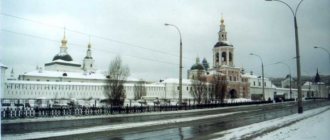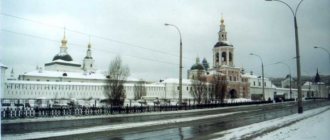What do heaven and hell look like? Eyewitness testimony would be very helpful in gaining at least some idea about these places. Clinical death is the main source of such stories.
And if these testimonies about heaven and hell also coincide with Christian ideas, for many this becomes almost 100% proof of the correctness of popular images of the afterlife.
But it's not that simple. Not everyone who has seen hell or heaven (according to them) can be unbiased witnesses for us.
Where is heaven: on earth, in heaven or somewhere else?
The Bible does not tell us how hell appeared, but only the Lord could have created it.
At first glance, the Bible does not say anything about who created hell. This gives rise to speculation. Like, God creates only good things. And hell is an ugly place, full of evil and suffering. It was clearly invented by some devil.
But this contradicts everything we know from Holy Scripture. If you study in detail the figure of the devil in the Bible, it becomes clear that it is quite difficult to even specify it.
Does this devil even exist or is it a metaphor for everything evil in man? The topic is large, worthy of a separate large book.
The correct depiction of hell on Orthodox icons is a dark place. Photo: belygorod.ru
We'll talk about hell. In the Bible there is only one Creator - the Lord. It refuses to other creatures in a similar capacity. Christianity does not say how hell appeared. But it is clear that something so grandiose could not be the creation of anyone other than the creation of the Almighty.
It would be strange to admit that God gave some demonic entity the right to create such grandiose spiritual, if you like, institutions, but did not say a word about this in the Holy Scriptures. Hence the only logical conclusion: hell is part of Divine creation.
The success of evil on earth
When the human race spent many millennia in cruel enslavement to a fallen angel, then the Redeemer promised by God appeared on earth. Before we begin to describe this greatest and most wonderful event, let us take a look at the state of the unfortunate world, while the Lord descended to earth and became man for the renewal and salvation of mankind. The world was immersed throughout its entire space in idolatry.
People, hating each other, envying each other, watered the entire surface of the earth with their blood in fierce battles, in which numerous peoples were exterminated and disappeared, reaped by the sword and deprived of their nationality through slavery and sale in the markets of the universe like cattle or soulless goods.
The disasters and destruction of mankind are recognized as the greatest glory for mankind, and the conquerors, stained with the blood of their brethren, were declared their gods during their lifetime. Other villains, distinguished by vile vices, were given divine honor upon their death. Satisfaction of the most shameful passions was considered the highest pleasure.
Some of the most rejected people entered into open communication with Satan, having clothed themselves with his power, they contributed to the strengthening of his dominion over the earth and humanity. This dominance has reached full development. The chosen people of Israel also bowed under this dominion. Extremely diminished in number and fallen in civil terms, this people fell under the rule of idolatrous peoples. His inner, essential power, which consisted in communication with God through knowledge and fulfillment of His will, was exhausted.
Life according to the commandments of God, which forms in a person the purity of mind and heart, which is overshadowed by Divine Grace, enlightening a person with true spiritual reason and Theology, was replaced for the most part by the school study of the Law, combined with neglect of living a godly life, which the scribes and Pharisees - that was the name of the Jewish scholars of that time time - they tried to replace it with pretense and hypocrisy.
These scientists, darkened by satanic pride, filled with contempt and hatred for all other classes of the people, are slaves of passions, incapable of faith due to their unlimited and frenzied attachment to earthly glory and earthly advantages.
Capable of this attachment to all kinds of crimes, the perpetrators of these crimes seized control of their faith, rejected the commandments of God from it, introduced into it their own absurd traditions, themselves striving in their blindness for destruction, and drew the people led by them to it.
Few, very few people remained faithful to God through their very lives and from such a life dependent and shining true knowledge of God. Their names are holy - in the Holy Gospel.
Hell in the Bible was called "Sheol", a place without light
In the Old Testament, hell is called Sheol. Greek texts translate this word as "hades" (Hades), although the ancient image of hell differs from the Hebrew.
The mention of “Sheol” among some Mesopotamian gods gives rise to the cautious assumption that for the ancient Semites Sheol was not only a place, but also a deity. Perhaps this was the name given to the wife of the god of death Mota.
Sheol is possibly the name of a goddess, the personification of the underworld.
We know little about Jewish ideas about hell. Apparently, this is a place devoid of light, where souls are kept, as if in a dungeon.
This makes Sheol related to Tartarus, but not to Hades. Hades is simply the kingdom of the dead, without any positive or negative evaluations. Tartarus is definitely a bad place, a dungeon. He is mentioned in the New Testament:
“For if God did not spare the angels who sinned, but, having bound them in the chains of hellish darkness, he handed them over to be judged for punishment.”
(2 Pet. 2:4)
Regarding hell, we know that there is a gate in this place.
“And I say to you, you are Peter, and on this rock I will build My Church, and the gates of hell will not prevail against it.”
(Matt. 16:18)
It is noteworthy that even in Mesopotamian myths, gates were a detail that was associated with hell.
Significant events in world history.
For our consideration, they recognize: (1) the creation of the world , (2) the creation of Angels , (3) the creation of man , (4) the fall of Lucifer , (5) the fall of the first parents , (6) the death of Adam , (7) the Resurrection of Christ , (8) ) Last Judgment . Each of these events significantly changed the composition of the universe and established new connections (and/or changed old ones) between its component parts.
If we try to consistently comprehend the cosmology of the created world from a Christian position, but not as extensively as Archpriest did. Vasily Zenkovsky, we get the following picture.
Is there a hell with demons and fire - no, Dante invented such a hell
What about hot frying pans and demons with tridents? The very image of the flame arose on the basis of fiery Gehenna (that same lake of fire). This is not hell, but a place where, according to the Bible, sinners from hell are yet to go.
“Both death and hell were cast into the lake of fire.”
(Rev. 20:14)
The hell in the illustration for Dante's Divine Comedy has nothing in common with the Christian idea of hell. Photo: eksmo.ru
The fiery hell is shown in Islam. Who came up with hell and fire for Christians? It was the poet Dante. He greatly distorted the idea of hell and the devil in The Divine Comedy.
Unfortunately, it is his fantasies that are known to a wide audience today. All that is in Dante's hell are fragments of Greek myths that have nothing to do with Christianity.
Clinical death survivors talk about heaven and hell, but their testimonies cannot be trusted
For many Christians, stories about hell and heaven are a kind of find, an opportunity to prove that their religion most accurately describes our world, in particular its afterlife.
But this is the wrong approach. Firstly, Christianity does not need anyone to prove its correctness. This has long been the most popular religion, which is not threatened. Almost every person on earth is familiar with it and, if desired, can study it in more detail.
The wild days of religious wars are over.
And miracles are now sought only by show-offers, who have no other way to strengthen their faith. Whether someone has seen hell, this does not change anything in Orthodoxy. It feels confident without dubious evidence.
Secondly, all kinds of “evidence” only distort people’s Christian ideas about the afterlife. Here, for example, says a certain “eyewitness” of the afterlife, Boris Pilipchuk:
“Behind the fiery gates I saw a cube shining with gold. He was huge."
One of the most popular images that people see at the moment of clinical death is a tunnel.
Photo: salik.biz How will such a story help Orthodoxy? The image clearly refers to the Hellraiser film series, or more precisely to the second part of the series, but not to the Holy Scriptures.
In complete harmony of creation and Creator
Garden of Eden. Vatican Code. 12th century
The entire universe contains numerous evidence of the Divinity of its origin. The most important of them is tripartiteness (trichotomy), reflecting the Trinity of the Persons of the Divine. This tripartiteness is manifested throughout the Universe, in all living and inanimate nature, in anthropology and, of course, in the trichotomy of the order established by God on earth. In the laconic and pithy narrative of the book of Genesis it is said that “the Lord God planted a garden in Eden in the east; and he placed there the man whom he had created” (Gen. 2:8). Subsequently, the words “We are going” and “paradise” became almost identical. But in the primary, biblical meaning, Eden is the name of the area, and paradise is the wondrous Divine Garden in the east of Eden, in which the Lord placed the first people. In this Garden of Eden, our first parents communicated with God directly and were in complete harmony between creation and the Creator - in heavenly bliss. There is a stable theological point of view, according to which in such a world order a three-part structure is also recognized: paradise, Eden and the rest of the world. Later, almost three millennia later, in the structure of the Jerusalem Temple, paradise became a prototype of the Holy of Holies, Eden - the sanctuary, and the world outside Eden - the courtyard. This same three-part structure is preserved in the structure of our New Testament Orthodox church: paradise - the altar, Eden - the meal (the central part of the temple, where the worshipers gather) and the vestibule, symbolizing the outside world.
Those who have seen hell describe it differently
And here is the evidence given by afterlife researcher Raymond Moody:
“When the demons continued to torment me, I tried to get rid of them, tried to crawl out of this cell of mine.
I looked in one direction, but there was impenetrable darkness, and I heard millions of human screams there.
It was very loud screams. And I also had this knowledge that there were a lot of prison cells like mine and there were, as it were, pits in a burning fire.”
Raymond Moody
psychologist
This is clearly not the hell the Bible talks about. This is hell, which came from the works of Dante. After such “evidence,” don’t skeptical people have reason to look down on religious people?
Christianity teaches that a person goes to heaven or hell after real death, and not after clinical death.
Eyewitnesses often talk about heaven and hell. Christian, esoteric and mystical media are very fond of publishing stories of people who have experienced clinical death.
But clinical death is not at all the condition that awaits us after death. The person in it remains alive and does not overcome the threshold that the deceased crosses. So is it possible to judge whether there is hell or heaven based on such memories?
9 circles of hell according to the Bible
There are other reasons not to trust such evidence:
- You can be immersed in a similar state using hypnosis. Renowned researcher Raymond Moody has collected hundreds of testimonies of stories about what people saw after death. He believed that stories about hell and heaven reflected the real picture.
- But the same researcher discovered that a person does not have to die at all. Sitting in front of a mirror in a dark room, people also saw heaven or hell in the reflection. Therefore, this is a game of the psyche.
Raymond Moody is a world-famous American psychologist and researcher of the afterlife.
The descriptions differ. If there was one specific heaven or hell, people would describe it in similar ways. But no. There are some common features, but either a light tunnel with blackness at the end, or a dark one with light.
The afterlife is completely different: somewhere dead relatives are waiting, and somewhere there are simply tables with dishes. It is more likely that each person has his own images from somewhere in the subconscious.
The descriptions reproduce religious ideas. It is interesting that not a single testimony of Christians describes an Islamic paradise, and the visions of Muslims do not reflect the religious views of Christians.
An African from a wild tribe during clinical death had never seen Jesus Christ.
Nor did he see the Apostle Peter, or anyone who introduced himself as a biblical character. The experience of dying is always based on those ideas and images that are close to the person himself.
In a state of half-asleep, people see the same thing. The famous Russian researcher Mikhail Raduga studied the phenomenon of the so-called out-of-body experience for many years. He proved that with the help of basic exercises, in just three days, any person can achieve an unusual state.
“I opened my eyes and stood up, but my body remained on the bed, and it was not a dream,” this is how volunteers describe the effect of Mikhail Raduga’s techniques. But the funniest thing about this is that the state that the author of the technique called “phase” is, in essence, a dream, just a very realistic one.
Mikhail is deeply convinced that many out-of-body experiences, meetings with aliens and visions of spirits are caused precisely by the play of the subconscious on the border between sleep and reality. A person without experience is simply not able to recognize the state of the phase.
It has been scientifically proven that the exit of the soul from the body most often occurs through dreams in a special state of consciousness. Photo: fb.ru
You can read about the psychological research of Mikhail Raduga on the official website
What is important for us is that, according to the researcher, almost any anomalous event that begins with the words “I went to bed” or “I just woke up” is nothing more than a person’s failure to enter a phase state.
House, Garden, City, Kingdom, Wedding Feast
In our country, the word “metaphor” is often associated with something non-specific and unrealistic. In fact, we are talking about things that are extremely concrete and real. You cannot explain to an African what snow is like without resorting to allegory, but you (unlike your interlocutor) know that snow is absolutely real, you remember how it melts in your hands and crunches under your feet. Paradise is absolutely real, extended, undeniable - more real than the world in which we live now - but we can only talk about it allegorically. Various metaphors can be useful because in our world, in our experience, there are glimpses of heaven - we live in a fallen world, but not in hell, and those good and good things that we know can serve as pointers to us.
For we know, says the apostle, that when our earthly house, this hut, is destroyed, we have from God a dwelling in heaven, a house not made with hands, eternal. That is why we groan, desiring to be clothed with our heavenly dwelling (2 Cor 5 :1,2). Paradise is our home; we are meant for him and he is meant for us. We do not go to a distant country; on the contrary, we are returning home. Sergei Yesenin has famous lines: “If the holy army shouts: / “Throw away Rus', live in paradise!” / I will say: “No need for paradise, / give me my homeland.” This may be great poetry, but it is a misconception of heaven. Paradise is our true Motherland, and what is sacred in Holy Rus' carries within itself reflections of paradise, points to paradise and will certainly be in paradise. It may be recalled that at the other end of Christian Europe, in the Celtic world, holy places, such as the famous monastery of Iona, were called "subtle" - places where the heavens "shine through" the earth's landscape - to those who have eyes to see them. The beauty of the universe - like the beauty of the Church - helps us, although “guessily, as through a dark glass,” to see reflections of paradise.
Scripture calls heaven a city—the heavenly Jerusalem. It must be said that the “city” in biblical times was not like a modern metropolis, where people, even crammed into a subway car, remain strangers to each other. The city was an organism, a unity in which people were bound together by bonds of mutual loyalty, common memory and common hope. The saved, as the prophet says, are written in the book to live in Jerusalem (Isaiah 4 :3). By entering the Church, we acquire heavenly citizenship; we have a hometown, where, as the apostle says, we are no longer strangers and strangers, but fellow citizens with the saints and members of God’s household (Eph 2:19 ).
Another image of heaven is a garden. The Persian word “paradise,” which has entered many languages to denote paradise, originally meant “a garden fenced on all sides.” The garden is full of plants, birds, and often domesticated animals. A garden is an image that speaks of nature. Poets, artists and composers have always tried to convey a sense of amazed awe at the beauty and majesty of the natural world. As someone said, trying to convey his feelings from visiting an ancient cathedral, “this is the kind of place where an atheist feels uneasy.” Nature is a huge cathedral, and when we enter the arches of the winter forest, we understand that we are in a temple. The beauty of nature points to the beauty beyond, as one man said when describing the view before him, “it’s like heaven for those who believe in heaven.” But in nature - as we see it now, in our fallen world - there is not only beauty, but also threat, parasites and stings, fangs and claws. Worse, man, in his relationship to nature, is more often a predator and robber than a gardener. But the Garden is not a wild forest into which the hunter enters to kill or be killed. In the Garden, the relationship between nature and man becomes harmonious. As the prophet Isaiah speaks of this world to come, Then the wolf will live with the lamb, and the leopard will lie down with the kid; and the calf, and the young lion, and the ox will be together, and a little child will lead them. And the cow will feed with the she-bear, and their cubs will lie down together, and the lion will eat straw like the ox. And the child will play over the asp's hole, and the child will stretch out his hand into the snake's nest. They will not do evil or harm in all My holy mountain, for the earth will be filled with the knowledge of the Lord, as the waters cover the sea (Isa. 11:6—9).
Another image of heaven is the image of the Kingdom. Nowadays, “kingdom” is often understood as “country”, “territory”. In Gospel times, it was about something else—dominion. We belong to the Kingdom of God if our King is Christ. As He himself says, the Kingdom of God is within you (Luke 17:21). This is a reality in which Christ is Ruler and lawgiver, a reality in which His love reigns.
Christ speaks of heaven as a wedding feast. It can be difficult for the modern reader of Scripture to understand the meaning of these two images—the feast and the marriage. Let's start with the feast. In first-century Palestine, people perceived the value of food very differently; they ate in moderation - often forced, due to lack of food, sometimes voluntarily, taking on a fast. Now, when food is sold on every corner, we have lost consciousness of its value, and only church fasts can restore to us an understanding of what a feast is, a joyful acceptance of the abundance of God's gifts.
But food had another function, lost in modern society. Today we live in a fast food culture, often eating alone or on the go, and we don't care about the person we happen to share a table with at a fast food cafe. But for the people of that time, eating with someone was the deepest manifestation of human communication and community. Something similar has survived in our time, when the family gathers around the same table. All of us gathered at the table, family or close friends, share not only food, but also each other’s lives. The feast was the opposite of not only hunger, but also loneliness; it satisfied the need not only for food, but also for human brotherhood.
This especially applied to the wedding feast, when the love of a young man and a girl united not only them, but also their families - people became relatives to each other. Marriage was an expression of what Biblical Hebrew called chesed—faithful, unfailing love. The vague yearning of first love, the expectation of something great, was realized when the lovers became spouses and started a family. A happy family, full of love and care, is an image of heaven; The closeness and understanding that exists between loved ones represents an image - albeit imperfect and damaged - of that love that will be the air and light of the next century.
You can starve and thirst not only for food and drink, but also for love, truth, beauty, meaning. The Lord himself uses this image of thirst and hunger when he says, Blessed are those who hunger and thirst for righteousness, for they will be satisfied (Matthew 5 :6). In Paradise the deepest thirst of the human heart will be quenched - we will come to the very Source of all goodness, beauty and truth, never to leave Him again.
Testimonies of those who have seen hell or heaven are useless for Christians
It is impossible to know everything about hell or heaven. We live in the earthly world clearly not by chance. The Lord established certain frameworks for our existence, and covered everything beyond them with a veil of secrecy. And if we completely trust the Almighty, then we must agree that this barrier is not accidental.
There is no description of hell in the Bible, just like heaven. It is quite obvious that God did not consider this knowledge so necessary for man
The Holy Scripture calls on a person to focus on the “here and now”, and already here become a person of faith, love and conscience.
Stories about hell and heaven are a strong incentive to make a person more active in the spiritual field. But such a reason makes a person’s spiritual enthusiasm itself not sincere.
Faith does not need a stimulus like heaven or hell.
Therefore, it is fair that the Lord calls a person to do good deeds at the call of his heart, and not because the poor mortal was frightened by hellish pictures.
Christianity cannot say unambiguously whether hell or heaven exists as a place, or whether these are states, metaphors, or something else. But be that as it may, believers have nothing to worry about.
Even when we cross the threshold between life and death, the caring Lord accompanies us. And you can always rely on Him.
By leaving a comment, you accept the user agreement
Notes on terms.
About space.
The inability to give the usual physical spatial indications of a particular place (coordinates) does not mean the absence of a place as such or a difference between places. Only God , Who is everywhere, is unlimited, and His creation is limited: if creation (man, Angel) is in one place, it (they) is not in another. The Holy Prophet Daniel waited for three weeks for the Angel sent to him, who was prevented from passing by the satanic army, and who finally passed only with the help of the Archangel Michael (Dan. 10:12-13). This means that although we are talking about “spiritual realities” to which “our concepts do not apply,” it nevertheless took the Angel three weeks to get where he needed to be. The angel could not be in two “places” at the same time; he needed to “come” from one place to another.
Therefore, when the word “place” is used further, this term will be taken in a broad sense. Whether in five-dimensional space, parallel, spiritual, whatever you like, it doesn’t matter - but this is exactly the place; place as a concept that characterizes the limitations of a creature and is inextricably linked with this limitation.
About the time.
The absence of time does not mean the absence of processes and cause-and-effect relationships. We know that there was a “time” when there was no time, and there will be a “time” when there will be no time. This biblical knowledge necessarily implies that neither God nor His creatures need any time in order to live (and not freeze).
It is difficult to even imagine that after the creation of the new earth and sky, all processes will stop. At a minimum, it is known that the righteous in heavenly Jerusalem will glorify God - in the absence of processes this would be difficult.
Man in heavenly Jerusalem will remain in the body, like our Savior. Returning to the body (renewed, spiritual) means for a person the return of the possibility of creativity. Incorporeal Angels are fundamentally deprived of this opportunity. So what, a creative person will live and not create?
When did time appear: before the creation of the world or after? And what is cause and effect: God’s plan for the world and man and, as a consequence, the creation of the world, or vice versa? Causes and effects, despite the lack of time, exist.
In short, the absence of time does not mean the absence of events, the absence of life and creativity .
Most likely, time is a service parameter of the damaged Universe , characterizing the non-decrease of entropy (increasing decay until death - the so-called “arrow of time”). Or maybe time is a category necessary to implement the process of changing a person’s state from cascading to non-casual (I may sin, I may not sin, I cannot sin). Unfortunately, it has not yet been possible to find clear indications in Scripture and Tradition.










